Over 8 in 10 app taxi users surveyed in India report presence of dark patterns like Bait & Switch, Forced Action, Nagging & Interface Interference on taxi aggregator platforms; Situation is deteriorating despite Government’s efforts
- ● 59% of app-based taxi users surveyed say have regularly experienced Drip Pricing
- ● Dark Patterns like Nagging where a consumer is repeatedly urged to pay advance tips also a concern
- ● Consumers have reported dark patterns on all taxi platforms like Uber, Ola, Rapido, Namma Yatri, InDrive and Shoffr
- ● Nationwide survey receives 94,000 responses from taxi aggregator service users across 282 districts
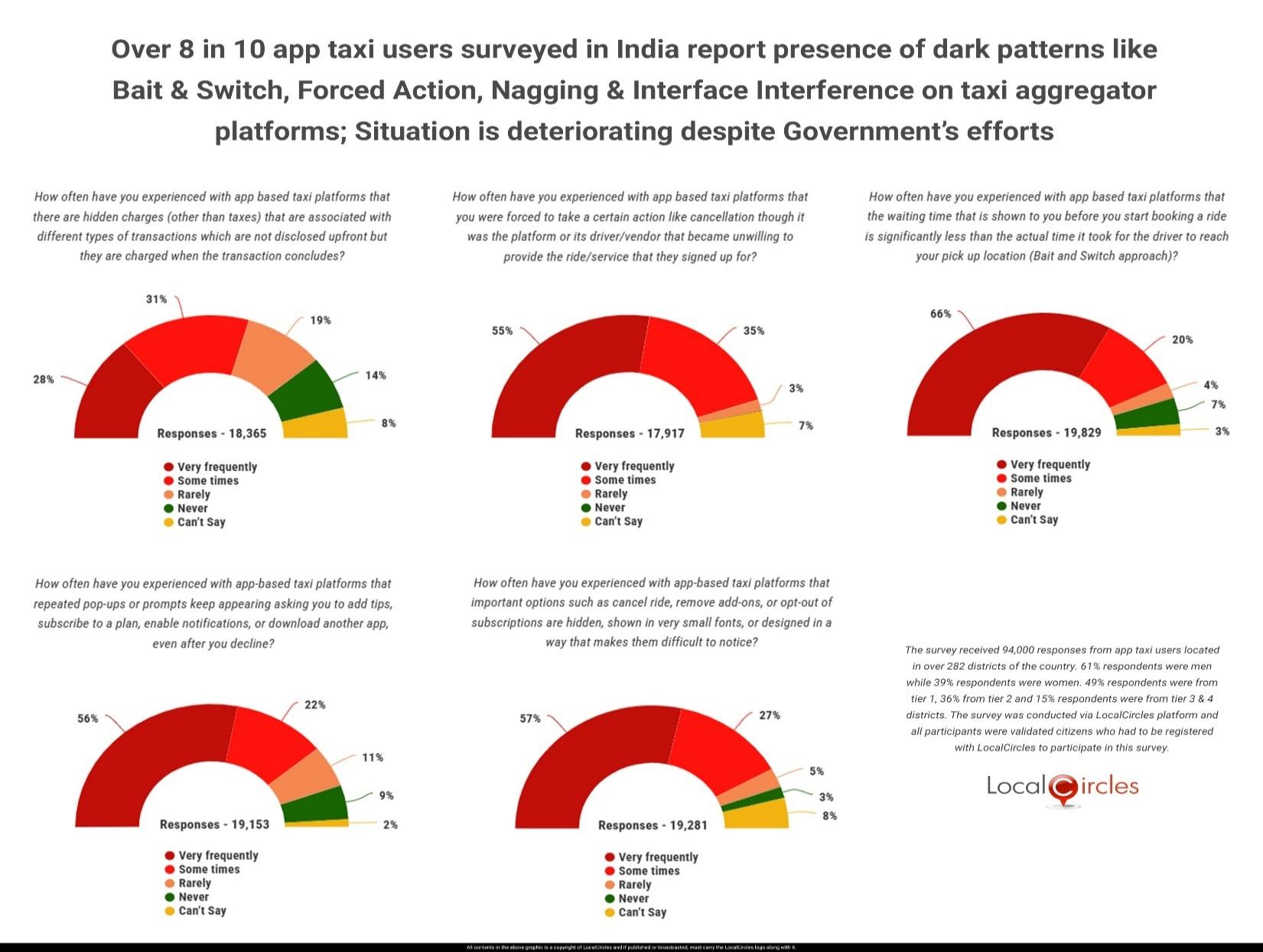
November 12, 2025, New Delhi: App-based taxis have seen significant growth in India, transforming urban mobility with convenience and real-time services. However, they face persistent issues like surge pricing, frequent ride cancellations by drivers, long waiting times, and concerns over passenger safety.
While the government has introduced regulations to address these and other dark patterns like hidden fees, and manipulative interfaces, user dissatisfaction remains high, with ongoing challenges in driver’s conduct and overall service quality. Acting on an increasing number of complaints about various deceptive tactics used by app-based taxi services, the Central Consumer Protection Authority (CCPA) earlier this year issued notices to Uber, Ola, Rapido, etc., for employing dark patterns.
In June, days after Union minister Pralhad Joshi asked CCPA to investigate why ride-hailing apps were nudging users for tips before the ride even began, the apps quietly introduced ‘Voluntary tip’. Now, when users are booking a ride, the advance tip option comes with a little label that spells out ‘Voluntary’. While the apps assure that ‘Riders can skip the tip, and the app won't hold their ride’ going by the rising complaints on social media, drivers of the app-based taxi services cancel rides at the last moment for no specified reason. Many users have qualified this advance tip as Nagging and demanded that a permanent disable option should be enabled by apps. 6 months down, the investigation by CCPA and BIS is yet to be concluded while the consumer complaints continue to mount. According to consumers, enforcement and UX ethics still have a long way to go.
A survey by LocalCircles in July revealed that 59% of app-based taxi users still face unfair trade practices and poor service. The survey also revealed that about 74% app-taxi users say that drivers cancel rides when they find out that the payment mode is digital, or the destination isn’t convenient to them or both. About 59% of the respondents said unfair practices and poor service continue, while only 18% noticed any improvement.
In a new survey, LocalCircles focused on dark patterns used by app-based taxi services out of 13 identified by CCPA and how they are impacting app-based taxi users. It attempted to understand the various deceptive design issues consumers face with taxi aggregators. The survey received 94,000 responses from app taxi users located in over 282 districts of the country. 61% respondents were men while 39% respondents were women. 49% of respondents were from tier 1, 36% from tier 2 and 15% respondents were from tier 3 & 4 districts.
59% of app-based taxi users surveyed say that they have experienced hidden charges (other than taxes) levied which were not disclosed upfront but added when their ride transaction concluded
App taxi users often complain about hidden charges or Drip Pricing dark pattern they are faced with. The survey asked app taxi users, “How often have you experienced with app-based taxi platforms that there are hidden charges (other than taxes) that are associated with different types of transactions which are not disclosed upfront, but they are charged when the transaction concludes?” Out of 18,365 app taxi users who responded to the question 28% of respondents indicated that they have experienced hidden charges “very frequently”; 31% of respondents indicated that they have “sometimes” experienced it; 19% of respondents indicated that they have “rarely” experienced it; 14% of respondents indicated that they have “never” experienced it; and 8% of respondents did not give a clear answer. To sum up, 59% of app-based taxi users surveyed say that they have experienced hidden charges (other than taxes) levied which were not disclosed upfront but added when their ride transaction concluded’.
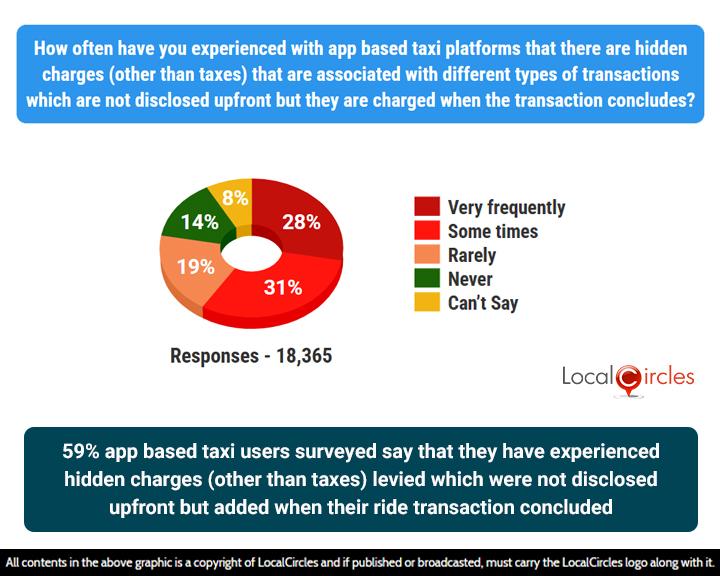
90% of app-based taxi users surveyed say that they have experienced forced action where they were made to cancel a ride where the platform or its driver became unwilling to provide the ride/service that they signed up for
It is not unusual for drivers of app-based taxi services to make confirmed rides wait much beyond the scheduled time on some pretext or the other. In many such cases, the app taxi/ auto user is forced to give up and cancel the ride, thereby having to pay penalty during the next ride. The survey asked app taxi users, “How often have you experienced with app-based taxi platforms that you were forced to take a certain action like cancellation though it was the platform or its driver/ vendor that became unwilling to provide the ride/ service that they signed up for?” Out of 17,917 app taxi users who responded to the question 55% indicated that they “very frequently” experienced forced action dark pattern; 35% of respondents indicated that they have “sometimes” experienced forced action; 3% of respondents indicated that they have “rarely” experienced it and 7% of respondents did not give a clear answer. To sum up, 90% of app-based taxi users surveyed say that they have experienced forced action where they were made to cancel a ride where the platform or its driver/vendor became unwilling to provide the ride/service that they signed up for.
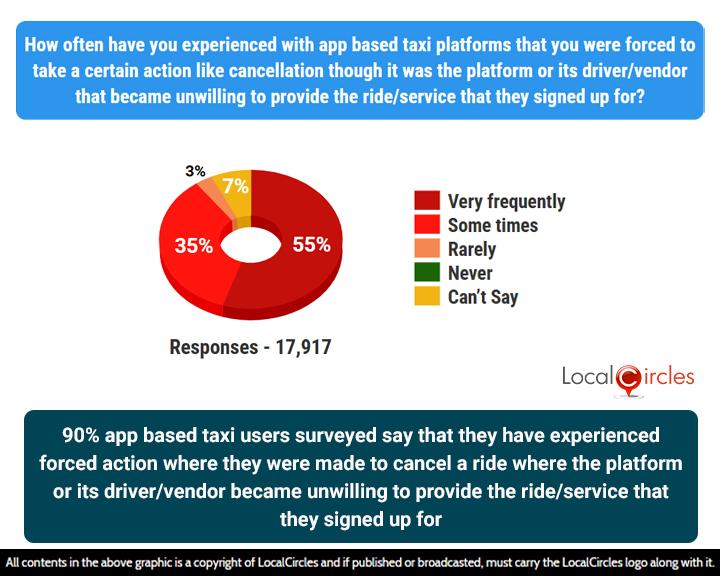
86% of app-based taxi users surveyed say that they have experienced bait and switch approach by the platforms where the waiting time that is shown to them before they start booking a ride is significantly less than the actual time it takes for the driver to reach them
Almost in every attempt to book, many app taxi users report that they are shown the nearest ride for their destination is a couple of minutes away, but on acceptance, in many cases they are presented that their driver will take 5-15 minutes to reach them. The survey asked app taxi users, “How often have you experienced with app-based taxi platforms that the waiting time that is shown to you before you start booking a ride is significantly less than the actual time it took for the driver to reach your pickup location (Bait and Switch approach)?” The question received 19,829 responses with 66% of respondents indicating that they have experienced Bait and Switch dark pattern “very frequently”; 20% of respondents indicated that they have “sometimes” experienced it; 4% of respondents stated that they have “rarely” experienced it; 7% of respondents indicated that they have “never” experienced it and 3% of respondents did not give a clear answer. In essence, 86% of app-based taxi users surveyed say that they have experienced Bait and Switch approach by platforms where the waiting time that is shown to them before they start booking a ride is significantly less than the actual time it takes for the driver to reach them.
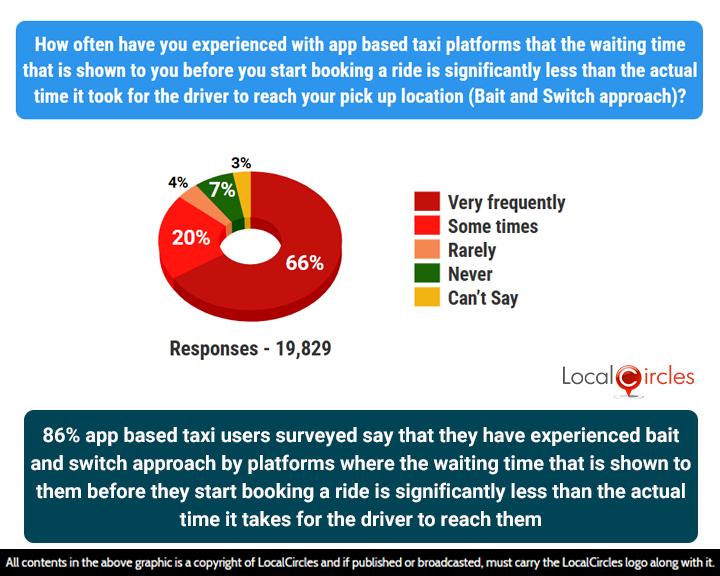
78% of app-based taxi users surveyed say that they have experienced nagging approach by platforms where repeated pop-ups or prompts keep appearing asking you to add tips, subscribe to a plan, enable notifications, or download another app, even after they decline
Some of the app-based taxi platforms use persistent pop-ups or prompts nudging users repeatedly toward advance tips, memberships, or add-ons, even after it has been declined. The survey asked app taxi users, “How often have you experienced with app-based taxi platforms that repeated pop-ups or prompts keep appearing asking you to add tips, subscribe to a plan, enable notifications, or download another app, even after you decline?” Out of 19,153 app taxi users who responded to the question 56% stated that they have “very frequently” experienced Nagging dark patterns; 22% of respondents indicated that they have “sometimes” experienced it; 11% of respondents indicated that they have “rarely” experienced it; 9% of respondents indicated that they have “never” experienced it and 2% of respondents did not give a clear answer. To sum up, 78% of app-based taxi users surveyed say that they have experienced nagging approach by platforms where repeated pop-ups or prompts keep appearing asking you to add tips, subscribe to a plan, enable notifications, or download another app, even after they decline
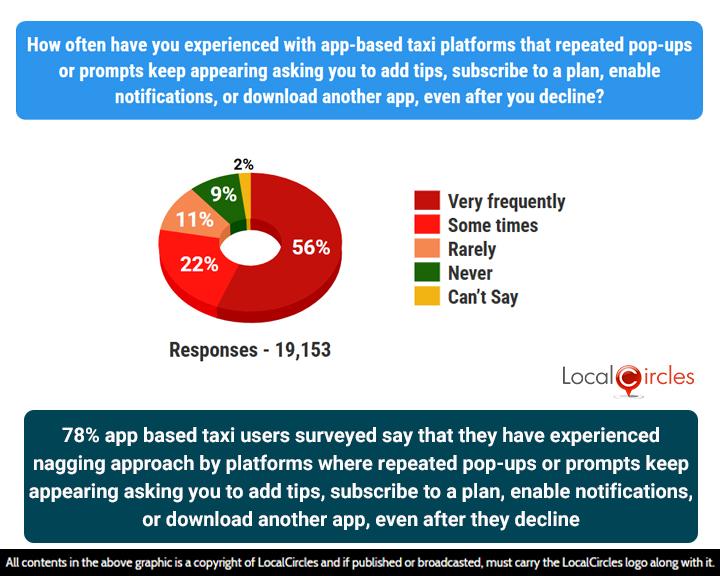
84% of app-based taxi users surveyed say that they have experienced interface interference approach by platforms where important options such as cancel ride, remove add-ons, or opt-out of subscriptions are hidden, shown in very small fonts, or designed in a way that makes it difficult to notice
App-based taxi services use Interface Interference dark patterns that make cancellation difficult with their multiple menus, unclear button placement, or prolonged animations to discourage cancelling. The survey asked app-taxi users, “How often have you experienced with app-based taxi platforms that important options such as cancel ride, remove add-ons, or opt-out of subscriptions are hidden, shown in very small fonts or designed in a way that makes it difficult to notice?” Out of 19,281 app taxi users who responded to the question 57% indicated that they have “very frequently” experienced Interface Interference dark patterns, 27% of respondents indicated that they have “sometimes” experienced it; 5% of respondents indicated that they have “rarely” experienced this problem; 3% of respondents stated they have “never” experienced this problem and 8% of respondents did not give a clear answer. To sum up, 84% of app-based taxi users surveyed say that they have experienced interface interference approach by platforms where important options such as cancel ride, remove add-ons, or opt-out of subscriptions are hidden, shown in very small fonts, or designed in a way that makes it difficult to notice.
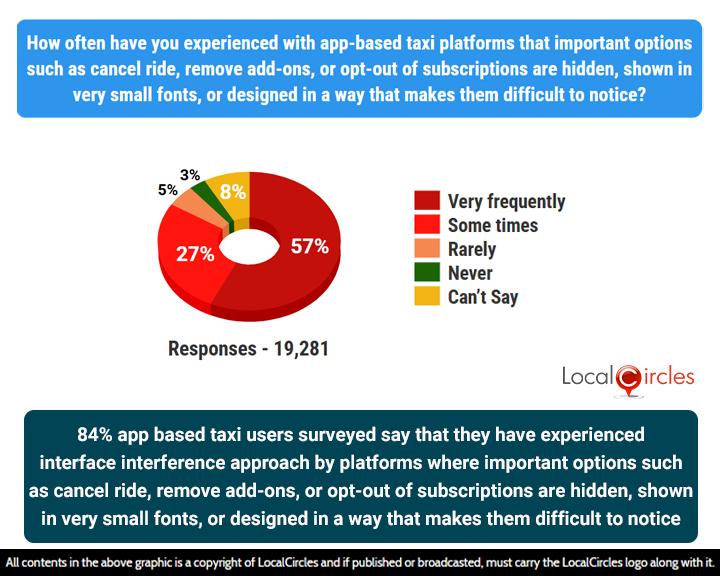
In summary, the study proves that dark patterns are very widely being used by app-based taxi platforms in India as 59% of app-based taxi users surveyed say that they have experienced Drip Pricing or Hidden Charges (other than taxes) levied which were not disclosed upfront but added when their ride transaction concluded. Another dark pattern widely used is Forced Action. 90% of app-based taxi users surveyed say that they have experienced Forced Action where they were made to cancel a ride and pay a penalty though it was the platform or its driver/vendor that became unwilling to provide the ride/service that they signed up for.
Many app-based taxi platforms strive to attract riders by showing a short time for the nearest taxi after they share their destination but then the time increases upon booking confirmation. This is a widely used dark pattern as 86% of app-based taxi users surveyed say that they have experienced Bait and Switch approach by platforms. Nagging to take a decision not necessarily in the interests of riders is another tactic employed. 78% of app-based taxi users surveyed say that they have experienced nagging approach by platforms where repeated pop-ups or prompts keep appearing asking users to add advance tips, subscribe to a plan, enable notifications, even after they decline to do so with no option of disabling them permanently.
Interface interference dark pattern through a convoluted design includes multiple menus, unclear button placement is also used by several app-based taxi platforms to discourage or make cancelling difficult. Many hide the cancellation option so users cannot find it. 84% of app-based taxi users surveyed say that they have experienced by platforms where important options such as canceling a ride, remove add-ons, or opt-out of subscriptions are hidden or displayed in very small fonts, or designed in a way that makes them difficult to notice.
In total, dark patterns in Indian ride-hailing apps are all pervasive, with forced cancellations, hidden fees, nagging and manipulative interfaces being particularly rampant. The need of the hour is for CCPA to speed up investigation and drive corrective action such that the interest of the consumer is protected when using services of taxi aggregators.
How Dark Patterns work on App Based Taxi Platforms
The dark patterns on app-based taxi platforms tend to nudge or even force consumers to often take decisions contrary to what they would like. Below are a few examples of how consumers end up paying more than what was originally shown as the waiting time and fare by the app and what they end up paying. Not forgetting the anxiety, they face while waiting for the promised ride.
Bait & Switch is used by taxi aggregators to mislead and attract consumers
Despite knowing the consumer’s location and the location of the nearest cab, a very short time for cab availability is shown as bait for the consumers, so they go to the next step of confirming the booking. Once they confirm, the actual longer wait time is displayed to them.
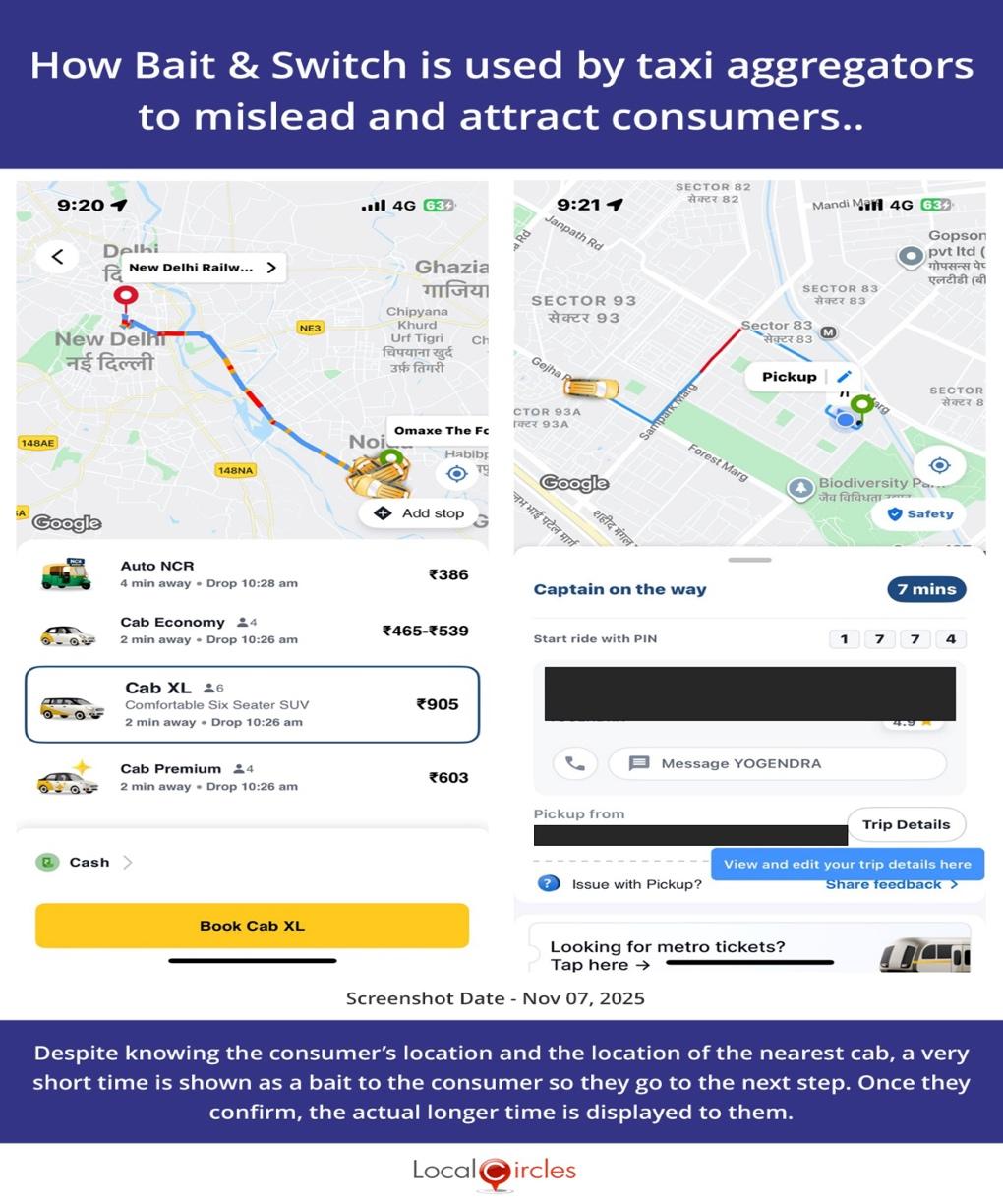
Interface Interference is used to discourage the consumer from cancelling a booked ride
Interface interference is used to discourage the consumer from cancelling a booked ride by making the cancellation process deliberately complex, confusing, or inconvenient through deceptive design choices. The cancellation flow is either hidden somewhere or made intentionally lengthy, requiring multiple screens and confirmation steps (e.g., "Are you sure you want to cancel?", "Please select a reason", "Yes, cancel") to create friction and deter users who are in a hurry or frustrated. Information about potential cancellation fees or policies might be buried in lengthy terms and conditions or linked to help pages, so the user is uncertain of the penalty until deep into the process.
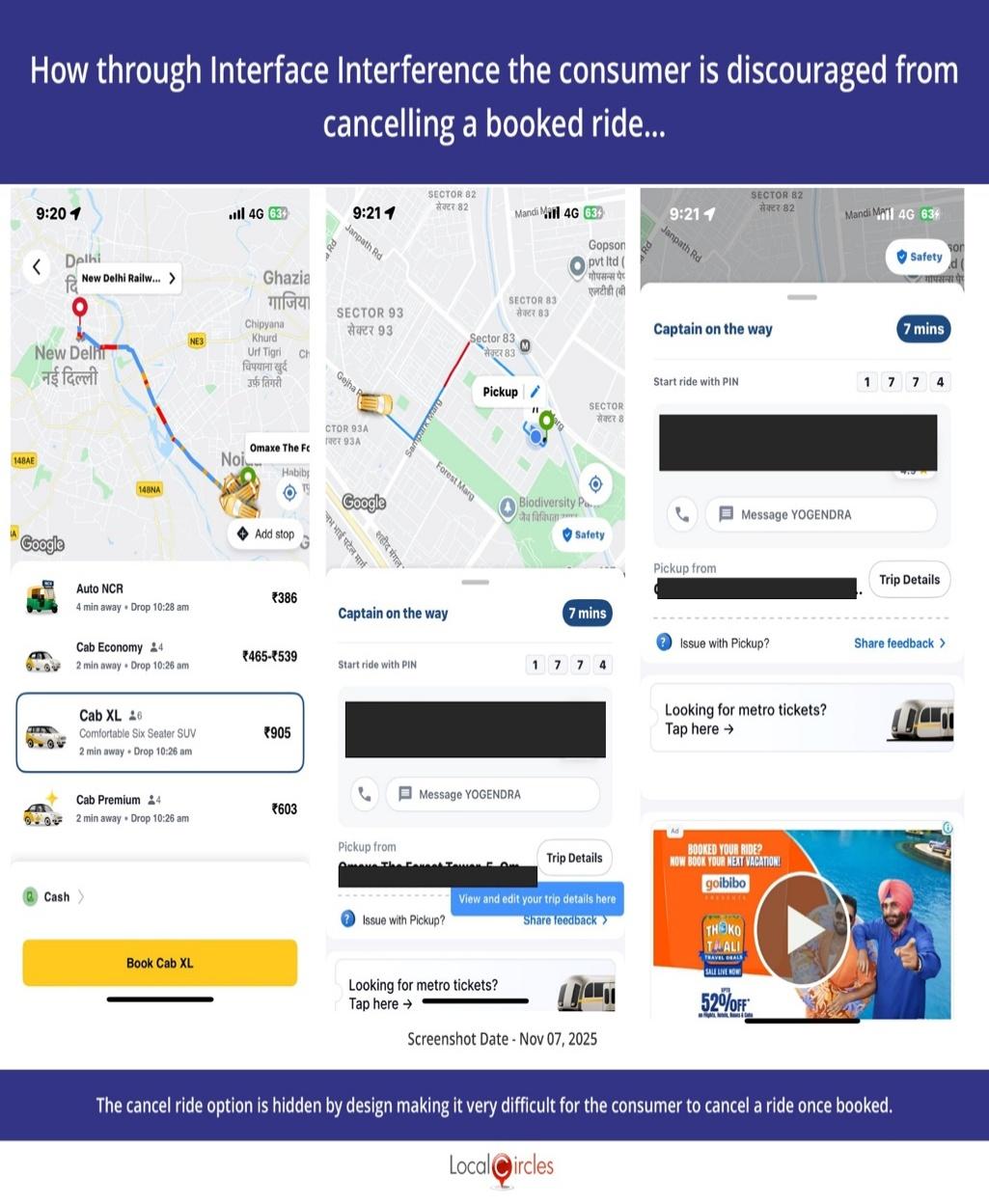
Drip Pricing dark pattern is used to charge the consumer significantly higher amount than the original quote
The consumer is shown a particular fare. Later, without traffic or route change and despite reaching the original destination on time the user is made to pay nearly twice the amount as fare.
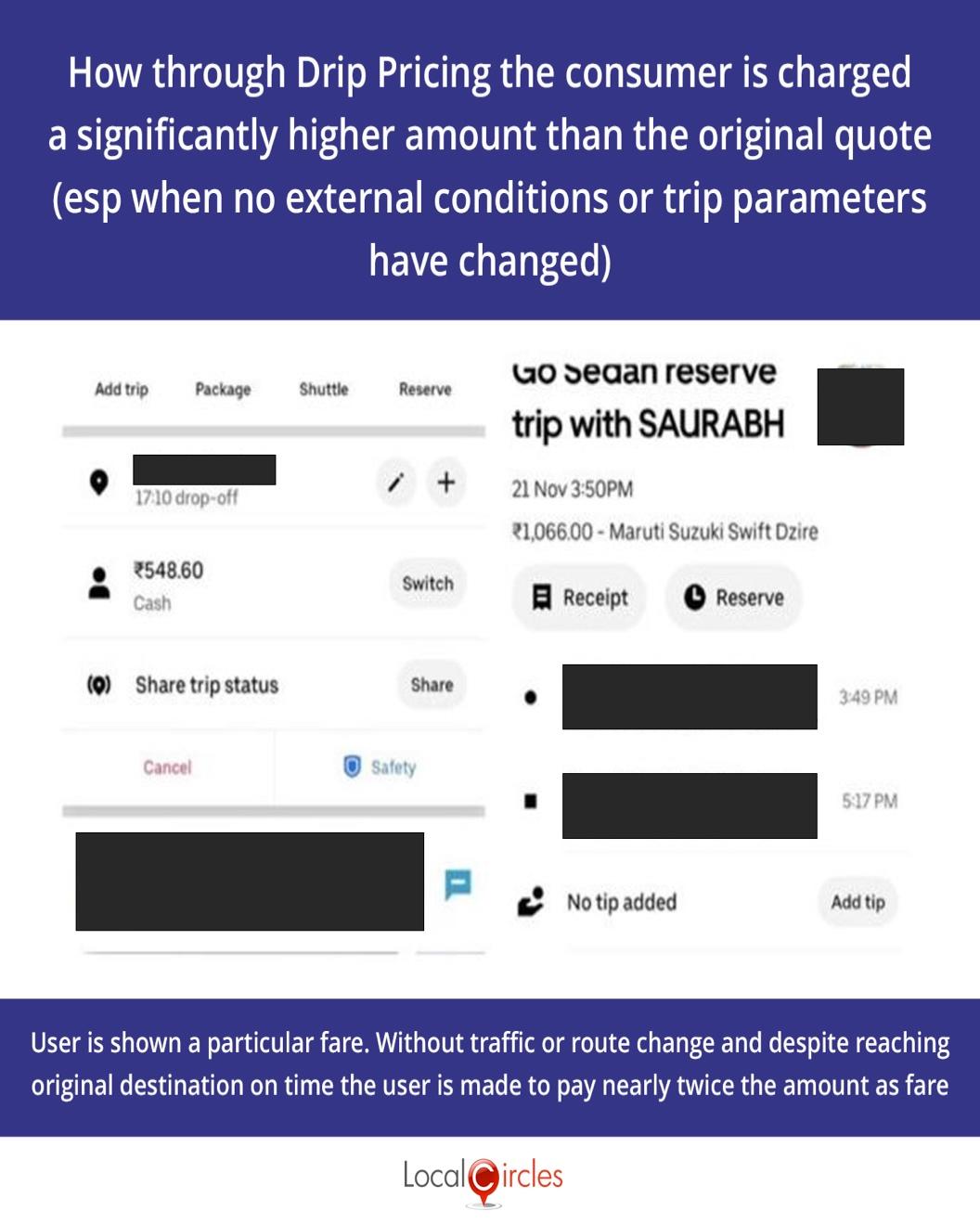
Nagging is used by the app to force a consumer who is booking a ride to add advance tip with no option to disable the request permanently
The user is shown a particular fare and then it is suggested in every ride that they must pay an advance tip to increase their chances of getting a ride faster with no option to permanently disable such a request.
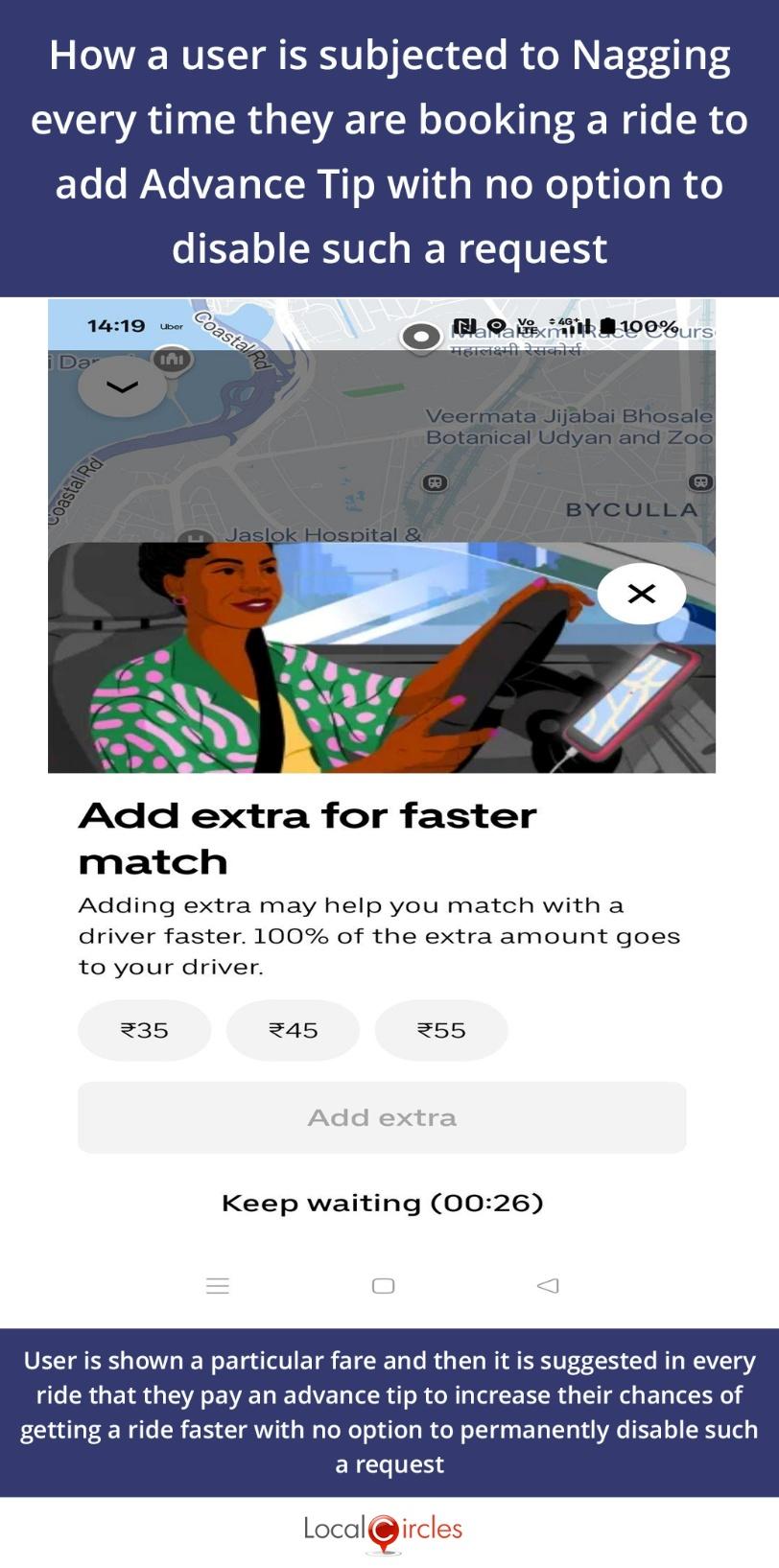
Forced Action dark pattern sees consumers having to cancel a booked ride due to driver’s failure to show up
User books a ride but the driver doesn’t respond or show up. After waiting long, the user cancels the ride and the taxi aggregator platform levies a cancellation fee while in essence it is the driver who should be charged or penalized. This experience often forces the consumers to pay more advance tips to ensure they get the next ride on time.
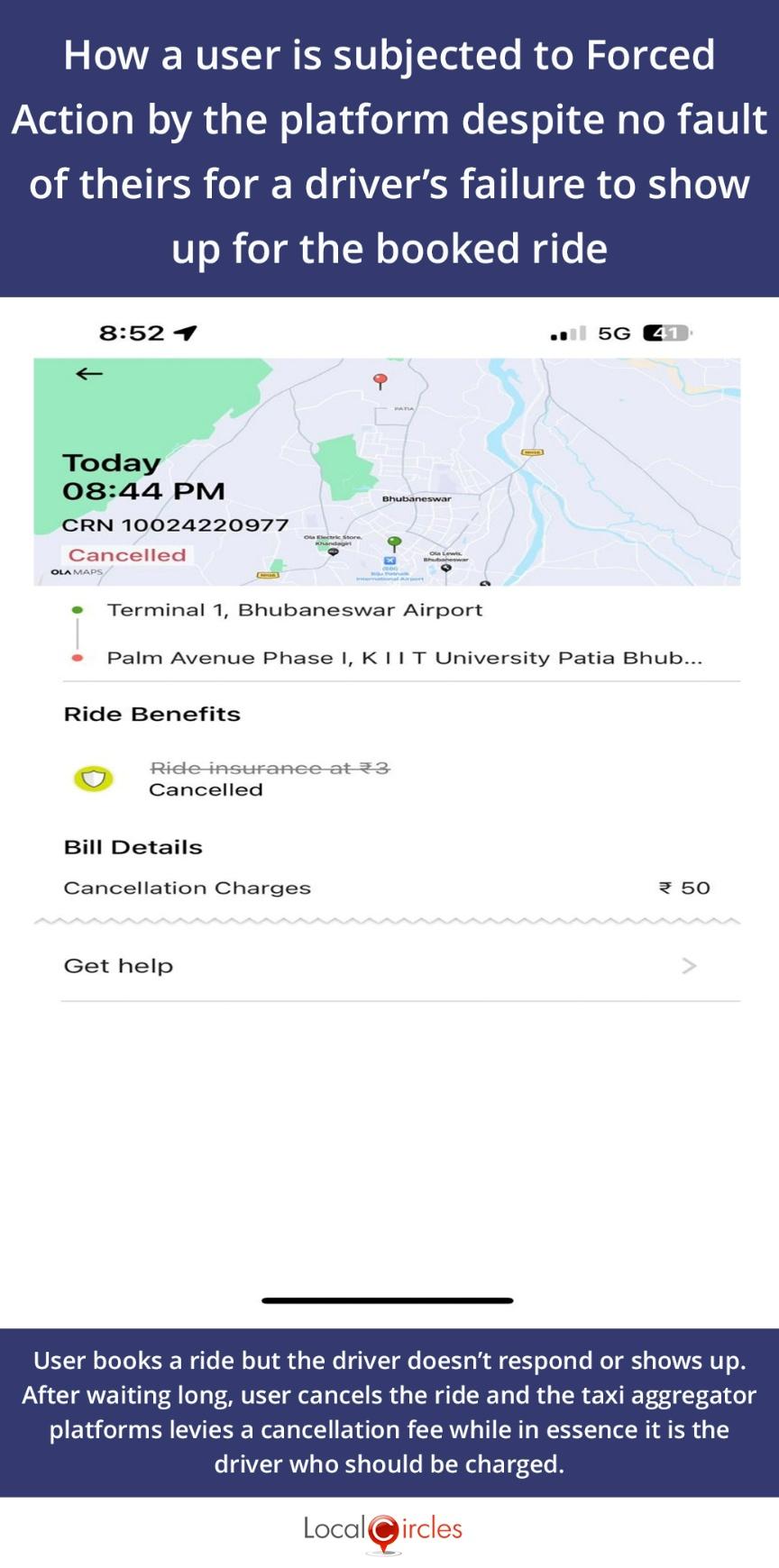
Survey Demographics
The survey received 94,000 responses from app taxi users located in over 282 districts of the country. 61% respondents were men while 39% respondents were women. 49% of respondents were from tier 1, 36% from tier 2 and 15% respondents were from tier 3 & 4 districts. The survey was conducted via LocalCircles platform, and all participants were validated citizens who had to be registered with LocalCircles to participate in this survey.
Survey Methodology
This survey has been conducted using the proprietary LocalCircles stratified sampling methodology. With a minimum target of 30% participation of each gender and a minimum target of 25% participation from each type of location i.e. (Tier 1/metro cities, Tier 2 cities, Tier 3 & 4 districts) on each poll, all polls were run. After the minimum participation criteria were met, all polls were run till they achieved steady state. Post achievement of steady state, the LocalCircles system using the bootstrapping technique drew additional samples to test for the margin of error. All polls were found to have a margin of error under 4% and a confidence level of over 96%.
About LocalCircles
LocalCircles, India’s leading Community Social Media platform enables citizens and small businesses to escalate issues for policy and enforcement interventions and enables Government to make policies that are citizen and small business centric. LocalCircles is also India’s # 1 pollster on issues of governance, public and consumer interest. More about LocalCircles can be found on https://www.localcircles.com
For more queries - media@localcircles.com, +91-8585909866
All content in this report is a copyright of LocalCircles. Any reproduction or redistribution of the graphics or the data therein requires the LocalCircles logo to be carried along with it. In case any violation is observed LocalCircles reserves the right to take legal action.
Enter your email & mobile number and we will send you the instructions.
Note - The email can sometime gets delivered to the spam folder, so the instruction will be send to your mobile as well


